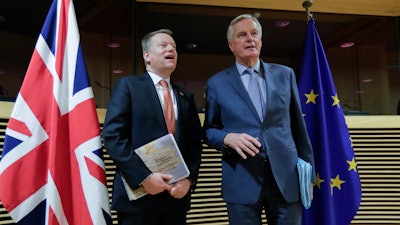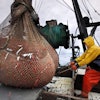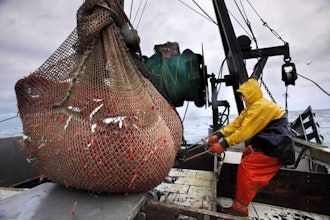
LONDON (AP) — The U.K.'s chief negotiator with the European Union said Wednesday it's looking increasingly unlikely the two sides will agree — as hoped — on the terms of access to each other’s waters by the end of next month.
Speaking to lawmakers, David Frost said he is “beginning to think we’re not going to make it by June 30” and that an agreement by that date was an “aspiration."
As part of the U.K.'s departure from the EU earlier this year, the two sides said an agreement by the end of June would mean new arrangements could be in place by the start of 2021, when the U.K. formally leaves the EU's economic orbit.
The U.K. left the political institutions of the EU on Jan. 31, but it remains inside the EU's tariff-free single market and customs union until the end of the year. That so-called transition period can be extended two years although a deal to do so has to be made by July 1, according to the legal documents accompanying Brexit.
Frost repeated once again that the U.K. will not request an extension.
“I think we have always put a lot of emphasis on economic and political freedom at the end of this year and on avoiding ongoing significant payments into the EU budget," Frost said. “And, of course, those things are accomplished by ending the transition period at the end of the year.”
Frost's comments came as his EU counterpart, Michel Barnier, said the 27-country bloc is “open” to a two-year extension.
Three rounds of talks have failed to produce much headway, notably around fishing rights. The U.K. wants a fisheries deal to be a standalone agreement whereby the two sides negotiate access and quotas. The EU, for its part, has sought to link fisheries to other trade issues.
Frost confirmed that British Prime Minister Boris Johnson is set to take part in discussions with EU leaders in June, though no date has been set for the summit. Another round of Brexit talks, conducted via video conferencing, is set to start Monday.
While worries about the coronavirus have dominated over the past couple of months, businesses and financial markets are still fretting about a “no-deal” Brexit that would see tariffs and other impediments imposed on trade. That's an even greater concern in light of the deep economic recessions both sides are facing as a result of the lockdowns governments imposed to curb the spread of the virus.






















